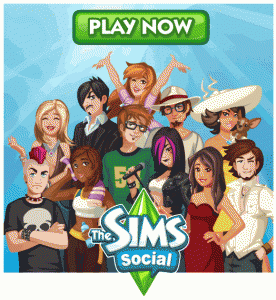 Over the last month 66,560,159 people have played the Sims Social on Facebook.
Over the last month 66,560,159 people have played the Sims Social on Facebook.
That is more than double the audience who tuned in for Ashton Kutcher’s recent debut on the hit sitcom “Two and a Half Men.” It is roughly twice the number of copies of “The Catcher in the Rye” sold during the last 60 years. And it is about 20 million more people than have ever purchased Pink Floyd’s 1973 classic “The Dark Side of the Moon.”
If you’re over 25 and haven’t had school-age children in the last decade, or ever, the Sims may not mean much to you. But plenty of others (meaning young people and parents of elementary and middle-school children) know all about it. They wouldn’t be surprised to hear that the Sims series has sold more than 140 million retail copies since its introduction 11 years ago. The only video game franchise that’s been more popular is Nintendo’s Mario. And now the Sims, made by Electronic Arts, has come to the world’s dominant social network, that staple of the daily lives of hundreds of millions of people around the world. I imagine that a few executives at Zynga headquarters in San Francisco are beginning to fret.
Zynga, of course, is the Wall Street darling that first identified and exploited the opportunity to lure millions of people into clicking on their farms and mafias every day on Facebook when they would otherwise be reading updates about the feeding habits of their ex-roommate’s infant. Zynga is the maker of what remains the No. 1 application on Facebook, CityVille.
But here’s the thing: the Sims Social has been skyrocketing in popularity since it went live in August. CityVille, on the other hand, has steadily lost players from its one-time high of more than 100 million last year. In danger of watching CityVille, its flagship game, cede the top spot to the Sims Social, Zynga has recently begun an aggressive series of promotions and discounts, including a deal with the pop star Enrique Iglesias. (His new video will be available early in CityVille.)
So how does the Sims Social, this Young Turk threatening to depose Zynga’s champion from the Facebook throne, actually play?
In fairness, pretty much like all the Zynga games, just dressed up in Sims mufti. As in traditional Sims games, you manage your avatar’s food, sleep, hygiene, bladder, social and entertainment needs. You build a house and furnish it. You can even harvest crops. (Sound familiar?) As with other Facebook games, the Sims Social is free to play, though it quickly encourages you to spend real money.
But there is one big distinction from those single-player games: in the Facebook version of the Sims you depend on an ever-widening circle of friends to advance. For example, to build a new couch you may have to ask your friends to send you wrenches (or you could pay real money). Later, if you want to expand your property, you may need even more friends to sign a petition.
There is a formula here. None of these big Facebook games are about developing your skill as a player. They are not about using your ingenuity and reflexes to overcome obstacles or explore interesting worlds or stories. They are about getting you to come back as many times a day as possible, to keep inviting more real-life friends to play and eventually to start spending real money directly on virtual items like cars and furniture.
As I’ve written before, they are business models dressed up as games. In many ways the entire genre is insidious and exploitative.
I used to think that was a bad thing.
But then I realized that what these major Facebook games are really selling is control. They are about giving you a little oasis, a patch of unreality that you can make just as perfect and ordered and neat as you like. When you are building your dream house or plantation or suburb, no one else can mess it up. No one is badgering you to change it or make it better. Not your parents, or your children, or your boss, or your boyfriend or your husband. It’s yours.
Surveys indicate that women broadly outnumber men on social networks and also use them more avidly. More narrowly, within social gaming, women also play much more than men.
Bookmark this page for “Facebook games” and check back regularly as these articles update on a very frequent basis. The view is set to “news”. Try clicking on “video” and “2” for more articles.









